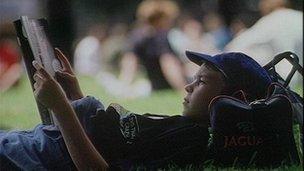Maths advantage for pupils who read for pleasure
- Published

The influence of reading for pleasure was greater than that of having a parent with a degree, the study indicated
Children who read for pleasure are likely to do better in maths and English than those who rarely read in their free time, research suggests.
The study, by the Institute of Education, London University, examined the reading habits of 6,000 children.
It indicated reading for pleasure was more important to a child's development than how educated their parents were.
The researchers concluded a wide vocabulary helped children absorb information across the curriculum.
They analysed the results of tests taken at the age of 16 by 6,000 children, all born in one week, from the 1970 British Cohort Study.
The findings showed those who had read often at the age of 10 and had been reading books and newspapers more than once a week aged 16 had performed better than those who had read less.
There was a 14.4% advantage in vocabulary, a 9.9% advantage in maths and an 8.6% advantage in spelling, the research found, once parents' background and reading habits were taken into account.
The study said: "The influence of reading for pleasure was greater than that for having a parent with a degree."
The total effect on children's progress of reading often - reading newspapers at age 16 and being a regular library user - was four times greater than the advantage of having a university-educated parent, the study suggested.
The Institute of Education also looked at the impact on test scores of having brothers and sisters and found that those youngsters with older siblings were less likely to do well, particularly in vocabulary.
It suggests this could be because children in larger families spend less time talking one-to-one with their parents and have less chance to develop their vocabulary skills.
There was less effect if children had younger brothers and sisters, although they may score lower on vocabulary, the study found.
Absorbing information
Study author Dr Alice Sullivan said: "It may seem surprising that reading for pleasure would help to improve children's maths scores.
"But it is likely that strong reading ability will enable children to absorb and understand new information and affect their attainment in all subjects."
Speaking on BBC Radio 4's Today programme, she said: "It absolutely makes sense that you would expect reading for pleasure to improve children's vocabularies.
"But I think that that also does improve children's ability to take on new information and new concepts across the curriculum.
"A child who has a narrow vocabulary may constantly be coming across things they don't understand."
- Published5 June 2013
- Published15 October 2012